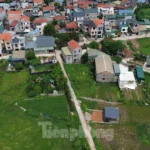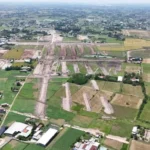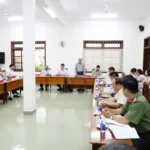Classification is key to preventing citizens from being “stuck”
In recent days, social media and local media in Nghe An have been abuzz with the story of a resident of Hung Loc ward, Vinh city, who shared their experience of having to pay almost VND 4.5 billion to change the purpose of use of a 300m2 garden plot to residential land, while real estate agents valued the plot at only about VND 3 billion.
This situation arose due to the new land price framework of Nghe An province for 2025, which was passed by the provincial People’s Council and took effect on May 21, with land prices in urban and rural areas increasing by 2 to 15 times compared to the 2020-2024 period.
Article 159 of the 2024 Land Law stipulates that the land price framework is used as a basis for calculating land use fees, land rent, taxes, fees, and penalties related to land. The provincial People’s Committee is responsible for developing and submitting the land price framework for the People’s Council’s decision and announcement, with the first framework taking effect from January 1, 2026, and subsequent adjustments made annually or exceptionally if necessary.
According to Mr. Huynh Ngoc Thanh, a planning expert, many localities have significantly adjusted land prices upwards. This policy needs to be viewed from both the state and citizen perspectives.
On the positive side, higher land prices ensure that citizens receive compensation closer to market prices when their land is revoked, reducing complaints. At the same time, the state also limits tax losses from real estate transactions and has a basis for calculating land use fees that are closer to reality.
However, on the other hand, citizens face difficulties when changing the land use purpose. Sudden price increases leave many unable to afford the financial burden, forcing them to withdraw their applications or postpone their plans to separate their household registries and convert agricultural land to residential land. Adjustments need to be made with a suitable roadmap to avoid shocking citizens.
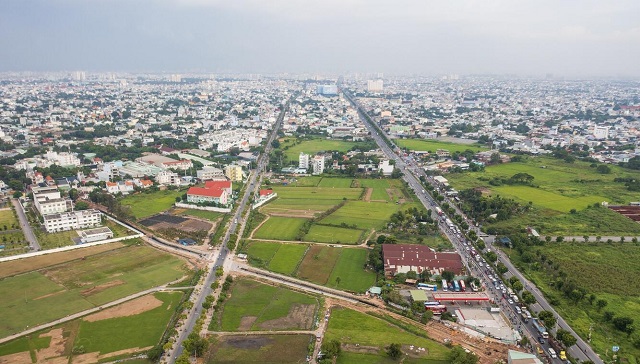
Ho Chi Minh City People’s Committee proposes expanding the number of cases eligible for land rent exemption or reduction. Photo: TL
|
According to Decision 79/2024/QD-UBND issued on October 21, 2024, the land price framework in Phu Nhuan District (old) has increased by an average of 5 to 5.6 times compared to the old framework under Decision 02/2020/QD-UBND. Based on the 2024 Land Law and Decree 103/2024/ND-CP, land use fees for converting agricultural land to residential land are calculated according to the new price framework.
For example, for 100m² of land for long-term trees on Dao Duy Anh Street, citizens used to only have to pay about VND 2.3 billion, but now they may have to pay more than VND 13 billion. This sudden increase has made it impossible for many households to afford, forcing them to postpone or give up their plans to change the land use purpose. As a result, many plans to build houses, separate land, and divide assets for their children have been stalled.
Independent real estate consultant Le Quoc Kien stated that each land policy has different impacts on different groups of subjects, depending on the management agency’s objectives in each period. For those who already own residential land, adjusting the land price framework towards market prices helps increase compensation when the state revokes land, thereby promoting site clearance and accelerating infrastructure project implementation.
At the same time, this policy helps curb land speculation and rampant land subdivision. On the other hand, those who own agricultural land or land that has not been converted to residential land will face more difficulties in changing the land use purpose due to increased costs. For businesses, especially project investors, higher input costs lead to higher real estate prices, shifting the burden to end buyers.
Currently, in the outlying areas of the old Ho Chi Minh City, there are still many agricultural land areas waiting to be converted to meet the legitimate needs of the people, such as separating household registries, dividing assets, or providing housing for their children to live independently.
However, this group of people is greatly affected by the new land price policy. Experts suggest that there should be a reasonable adjustment mechanism to support long-term residents in converting small areas of a few dozen square meters for residential purposes, while avoiding applying this to investors who hold large areas of land of several hundred or thousand square meters, waiting to separate and convert agricultural land to residential land for profit.
Flexible adjustments and suitable roadmaps are needed
Sharing with the media, Lawyer Tran Minh Cuong from the Ho Chi Minh City Bar Association said that the principles of valuing public assets are stipulated in the 2023 Price Law and the Vietnamese Valuation Standards. Valuation must ensure objectivity, transparency, and conformity with market prices at the time of valuation, while reflecting the true value of the asset. The aim is to avoid state budget losses and ensure fairness for citizens.
However, in some cases, the land price framework issued by the state is higher than the actual market price, especially in areas with few transactions or strong market volatility. This can lead to citizens having to pay land use fees higher than the actual value, causing inconsistencies and possibly not fully complying with the principles of valuing public assets as mentioned.
“I think the land price framework should be updated more frequently or allow flexible application of market prices through independent appraisal in some specific cases,” he said.
Expert Huynh Ngoc Thanh added that the current land price policy is aimed at market-oriented pricing, in line with the socio-economic development context, while ensuring a balance of interests between citizens, businesses, and the state.
At the same time, to avoid shocking citizens when land prices are adjusted upwards suddenly, the state needs to build a clear roadmap for implementation. The issuance of adjustment decisions can be done in phases, with small increases spread over the years, helping citizens reduce financial pressure and have time to adapt, thereby creating conditions for the effective implementation of policies.
Especially in the current context, where changing the land use purpose from agricultural to residential land is a topic of concern, narrowing the gap between agricultural land prices and residential land prices is necessary. The wide gap makes the tax burden on citizens too heavy when converting land use. Suitable adjustments will help reduce conversion costs while ensuring revenue and common interests.
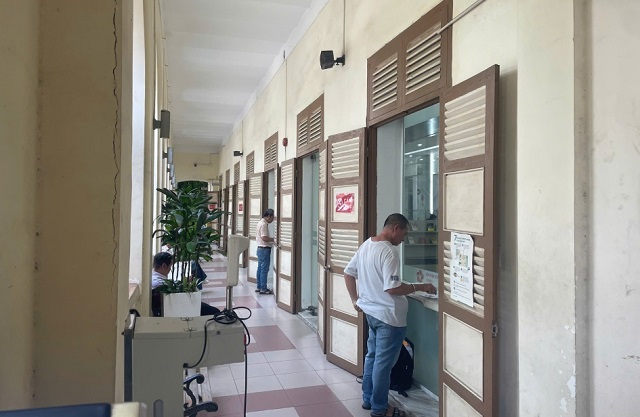
Many people are doing paperwork and administrative procedures related to land when there is a new land price framework. Photo: Hoang An
|
The lawyer also suggested that in cases where citizens have submitted applications for changing the land use purpose but then lack the financial capacity to pay the land use fee, the current law allows for specific measures.
First, citizens can apply for a debt record for land use fees if they fall under the subjects specified in Clause 1, Article 22 of Decree 103/2024/ND-CP, Point a Clause 11 Article 18 of Decree 101/2024/ND-CP, and Clause 1 Article 26 of Decree 88/2024/ND-CP.
Second, if eligible for preferential treatment under Article 157 of the 2024 Land Law, citizens may be exempt from or reduced land use fees.
In cases where they are not eligible for debt recording or exemption, citizens can still proactively withdraw their submitted applications to temporarily halt the change of land use purpose.
Hoang An
Negligence in Handling Land and Construction Violations in Hanoi: An Ongoing Challenge
From July 1st onwards, 126 wards and communes across Hanoi will officially commence operations following a restructuring process. However, there remains a significant number of illegal constructions and land-use violations in the districts of Chuong My and Dong Anh that require immediate and decisive action.
Transforming Land Use: Fees to Surge by 300%
The new land pricing policy has resulted in a significant increase in taxes for those wishing to change their land usage. With a 250-300% surge in taxes for converting agricultural land to residential use, many individuals are now facing financial difficulties due to the substantial rise in land use conversion costs.
“Handing Over Information on the Residential Area Project with Numerous Violations to the Police for Verification”
“The Secretary of the Dak Lak Provincial Party Committee has directed the Provincial Inspectorate to forward information regarding violations in a residential project in Buon Ma Thuot City to the public security authorities for verification and handling.”



